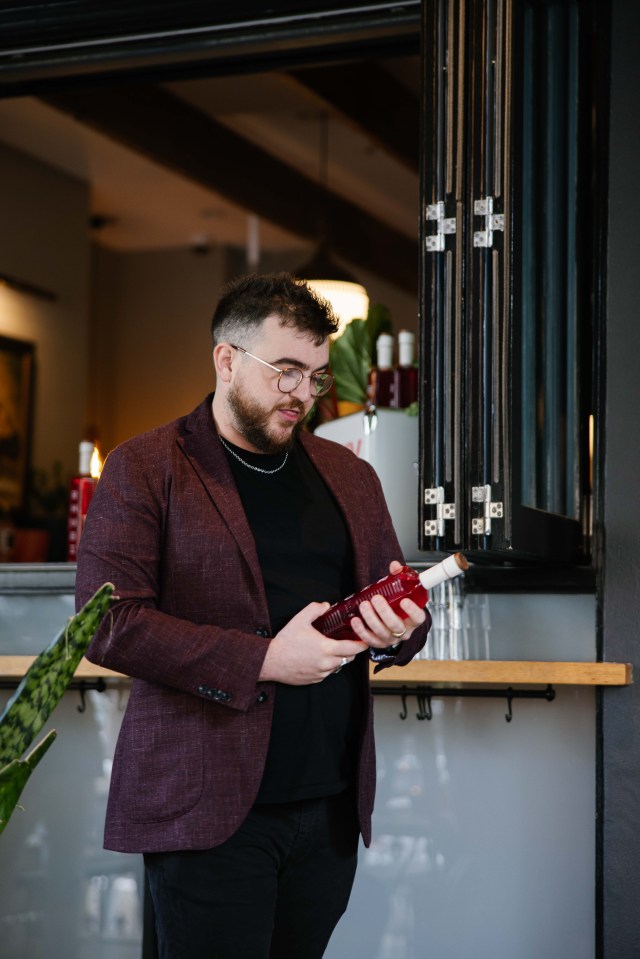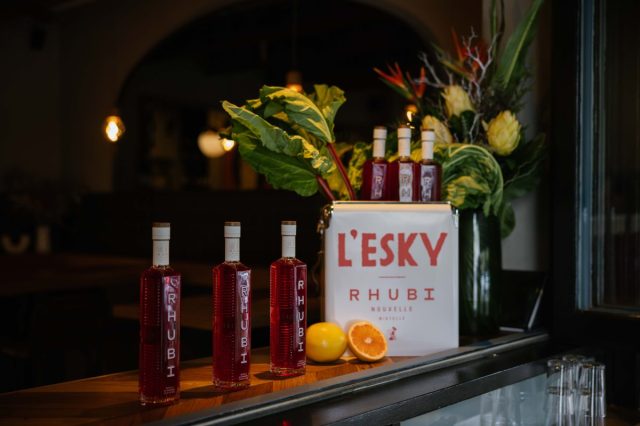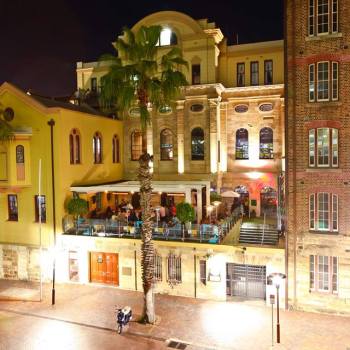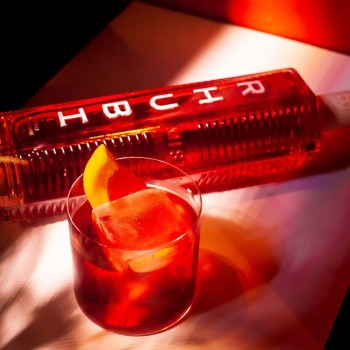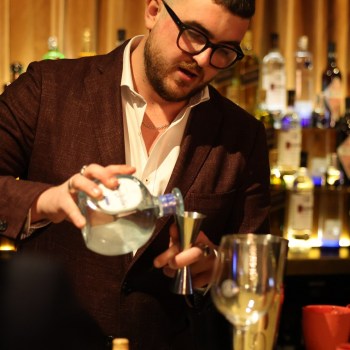After COVID-19 curtailed Rhubi’s initial introduction to the trade, an intimate event was held at Dead Ringer in Surry Hills on Friday, 9 September.
Evan Stroeve (previously of Bulletin Place and Re), was on-hand to introduce the rhubarb-flavoured liqueur, alongside business partners Linn and Tim Philips-Johansson, and Dave Hobbs.
Evan explained the brand’s origin.
“I’ll take you back two years – Tim, and Dave and I worked together at a bar called Bulletin Place, a very very special bar. We miss it, as it was a beautiful place,” Evan said
“The catch with that place was a new menu every day. Always five new drinks.”
Evan explained that Rhubi was originally created as an in-house cocktail ingredient to meet the demands of the changing menu.
“In truth, the original formulation of Rhubi – we never intended it to be come a brand, and we never anticipated that we would create Rhubi out of this very, very simple idea,” Evan added.
“It was an attempt on our behalf to try and figure out how to work fermentation and trends like low-ABV drinking into a menu that literally changes every single day.
“Rhubi was very basic when we started. It was fresh rhubarb juice, fortified with rhubarb spirit.”
Evan also explained that Rhubi represents something of a rebirth of an overlooked drinks category in Australia: mistelle.
“It was touching on this – I don’t want to say forgotten category – of mistelle.
“Traditionally it’s a mixture of fresh or fermented fruit juice, which has been fortified with spirits from the same fruit. So being in France, this would always be traditionally cider apples and cider pears, or wine producing grapes for Cognac.”
Rhubi, as the name suggests, is made with seasonally grown Australian rhubarb, which is kept in cold storage. To this, a juniper essence, alongside some more traditional botanicals you would typically find in vermouth or gin, are also added, along with a rhubarb spirit.
“We really tried to stay true to the tradition through our bottling and our image. So the paneling on the side of the bottle is an homage to Monet’s home in the spiritual home of mistelle in Giverny, he has these beautiful shuttered windows,” Evan says.
“On top of the bottle we have a little cap with the French symbol of liberty, La Semeuse [which translates as, ‘the sower’].”
However, Rhubi is not just an imitation of those traditional French liqueurs, as Evan illustrates.
“We’ve tried to extend it to become a little bit more modern, and a little bit more Australian. So taking rhubarb, rather than those traditional fruits, we wanted to use something a little bit more close to home, and rhubarb has a natural acidity, a touch of sweetness and a kind of earthiness that makes it a really versatile ingredient to work with.”
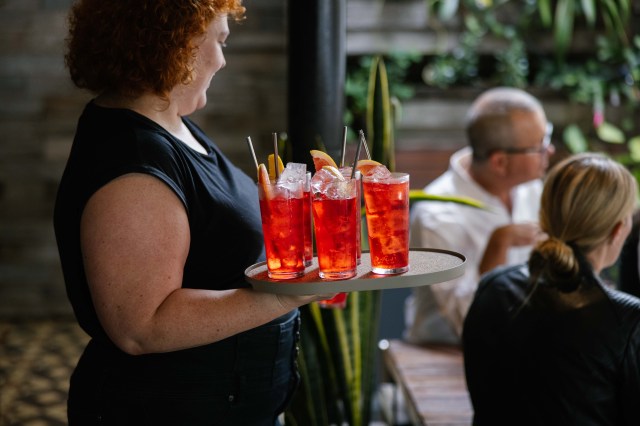
When it comes to a signature serve, its quite simple: soda water, and perhaps a grapefruit garnish.
“It’s built for soda, its built for bubbles, its built to be in a spritz,” Evan proclaims.
However, this doesn’t mean that there’s no room for creativity, with Evan continuing: “We want Rhubi in the hands of bartenders, we want to see bartenders creating amazing cocktails, and we want to empower that creative agency that’s synonymous with so many wonderful bartenders in Australia.”
For the at-home consumer though, its an obviously attractive proposition.
“Gone are the days of having to cut citrus and limes, and having mixing materials all over your kitchen on a Friday afternoon, having people round for spritzes and having half a bottle Prosecco left in your fridge for a week.”
“Our recommendation if you’re drinking at home, or you’re drink Rhubi out at a bar is just add soda. It’s that easy. It’s that simple.”
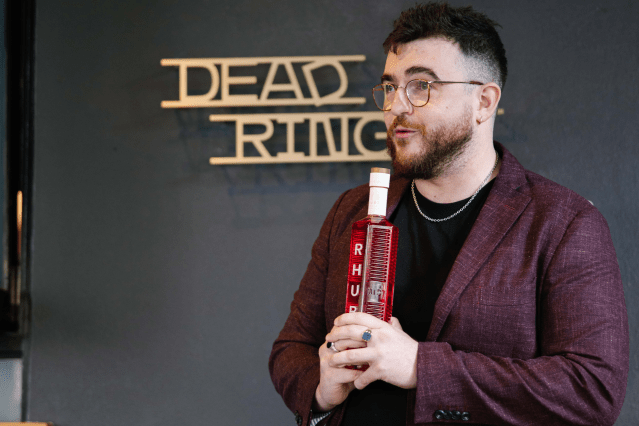
Bars and Clubs sat down with Evan to talk about what had motivated him to create Rhubi.
“Look, it’s no secret anymore that low-ABV, as a global industry, is thriving. I was looking at some stats the other day and it was something like two out of five people are now option for lower or no alcohol,” Evan explains.
Rhubi itself sits at 18 per cent ABV when served neat, with the product designed to be mixed.
“People are becoming more health conscious, they want to be able to drink a couple of creative cocktails and not walk out feeling hammered.”
Rhubi also has a strong selling point in its category, in that it remains a still somewhat rare example of an Australian made aperitif or mistelle.
“Australia naturally is proud of its produce. There is definitely a kind of patriotism when it comes to Australian products. You see bars all over the country that are now exclusively Australian,” Evan says.
The event itself was partly about acknowledging how far the brand had come.
“When we initially launched, we focused primarily on the hospitality industry. And it consisted of my business partner, Tim and I, literally going out with bottles of Rhubi to bars and restaurants.”
“It was picked up by a couple of magazines and stuff, but we never actually had a launch event,” Evan adds.
And as for long-term strategy, the on-premise remains front and centre.
“We’re partnered with Vanguard [Luxury Brands], our distributor for both sectors. We want to be everywhere. We will obviously want to be used by the country’s bartenders and sommeliers, but we also want to have a bit more access to consumers at home”
“It’s all built around low-ABV drinking, and ease of use,” Evan concludes.
